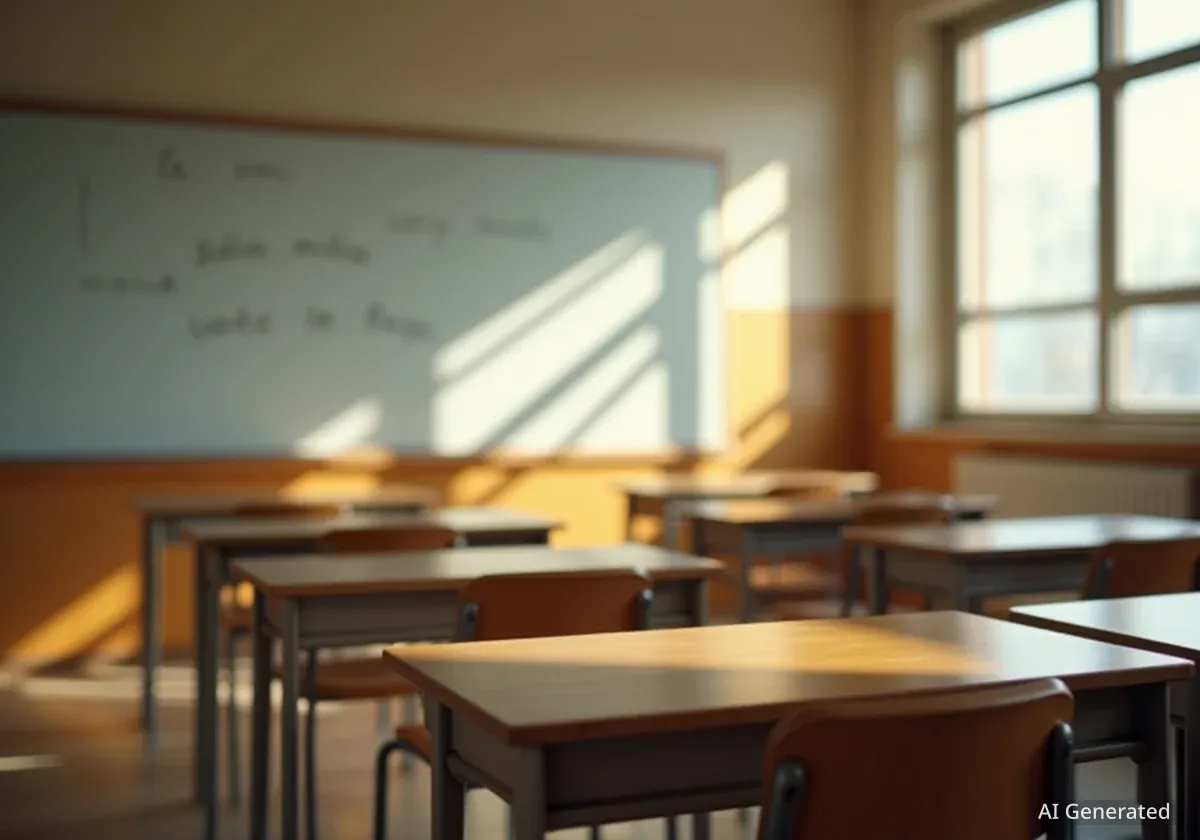Six years after the COVID-19 pandemic began, English Language Arts (ELA) proficiency scores for Rhode Island students are still lower than pre-pandemic levels. New data from the 2025 Rhode Island Comprehensive Assessment System (RICAS) shows that less than 34% of students in grades 3-8 met or exceeded expectations in ELA, highlighting an ongoing challenge for the state's education system.
Key Takeaways
- ELA proficiency in Rhode Island is 33.7% for 2025, down from 38.5% in 2018-2019.
- Math proficiency increased to 31.4% in 2025, up from 29.8% pre-pandemic.
- Two out of three students are not meeting proficiency standards in ELA.
- Chronic absenteeism significantly impacts student performance, with chronically absent students scoring 18.5% lower in ELA and 21% lower in Math.
- Five schools received recognition for improving both academic performance and reducing chronic absenteeism.
English Proficiency Shows Decline Since 2019
The Rhode Island Department of Education (RIDE) released its 2025 RICAS scores on Thursday. The data indicates a notable drop in English Language Arts proficiency when compared to figures from before the pandemic. In 2025, the ELA proficiency rate was 33.7%. This represents a 12% decrease from the 2018-2019 academic year, when ELA proficiency stood at 38.5%.
This means that for every three students in Rhode Island, two are not achieving the expected level of proficiency in English. The RICAS assessment measures student performance in grades 3 through 8 annually. The continued struggle in ELA highlights a persistent academic gap that the state is working to address.
ELA Proficiency Trends
- 2018-2019: 38.5% ELA proficiency
- 2025: 33.7% ELA proficiency
- Percent Decrease: 12%
Math Scores Show Modest Improvement
While ELA scores show a decline, math proficiency rates have seen a slight increase. RIDE reported that in 2025, math proficiency reached 31.4%. This is an improvement from the 2018-2019 figures, which reported 29.8% proficiency in mathematics. This upward trend in math contrasts with the ongoing challenges in English Language Arts.
State education officials have acknowledged the progress in math. They also recognize the significant work still needed to bring all student groups to proficiency levels across both subjects. The results provide a mixed picture of academic recovery and growth in the state.
"Rhode Island students have experienced consistent academic growth over the past three years due to the hard work of our educators, families, and partners," said Commissioner Angélica Infante-Green. "We are seeing real momentum in our classrooms, and we’re especially proud that results for most student groups, regardless of background, showed growth this year. RIDE has prioritized strengthening our supports for students and teachers alike and promoting excellence in teaching and learning. We know that there is more to do. Our state has momentum and our progress will continue."
Impact of Chronic Absenteeism on Student Performance
Chronic absenteeism continues to be a major factor affecting student performance on RICAS assessments. According to RIDE, students who are chronically absent consistently score lower than their peers who attend school regularly. This disparity is significant across both ELA and math categories.
Specifically, chronically absent students score 18.5% lower on RICAS ELA tests. In mathematics, the performance gap is even wider, with chronically absent students scoring 21% lower on RICAS Math tests. These statistics underline the critical link between consistent attendance and academic success.
RIDE has implemented various initiatives aimed at reducing chronic absenteeism. Through these efforts, the department reports a 12 percentage point decrease in chronic absenteeism statewide. This reduction is a positive step towards improving overall student outcomes.
Defining Chronic Absenteeism
Chronic absenteeism typically refers to missing 10% or more of school days, for any reason. This includes both excused and unexcused absences. High rates of chronic absenteeism can severely disrupt a student's learning trajectory and impact their long-term academic and social development.
Schools Recognized for Academic and Attendance Improvements
Five schools across Rhode Island received special recognition for their efforts in improving both student attendance and academic performance. These schools earned a spot in the "5-5-5 Club." To qualify, schools needed to cut chronic absenteeism by at least 5 percentage points. They also had to improve academic performance in both ELA and math by at least 5 percentage points.
The recognized schools include a mix of elementary, middle, and high schools. This achievement highlights successful strategies in addressing attendance issues and boosting learning outcomes. Their success provides valuable insights for other schools aiming for similar improvements.
"5-5-5 Club" Honorees
- Excel Academy (Elementary and Middle School)
- Gaudet Learning Academy (Elementary and Middle School)
- Beacon Charter Schools (High School)
- Blackstone Valley Prep High School (High School)
- South Kingstown High School (High School)
These schools demonstrate that targeted interventions can lead to measurable progress. Their achievements are a testament to the dedication of educators, students, and families in these communities. The state continues to explore ways to replicate these successes across more districts.
Ongoing Efforts and Future Outlook
RIDE emphasizes that despite the progress in certain areas, there is more work to be done. The department plans to continue strengthening support systems for both students and teachers. These efforts include promoting excellence in teaching and learning practices across all grades and subjects.
The goal is to ensure that all students, regardless of their background, have the opportunity to achieve academic success. The 2025 RICAS results serve as a benchmark. They guide future educational policies and resource allocation decisions aimed at improving student proficiency statewide. The focus remains on building on current momentum to achieve further progress.





